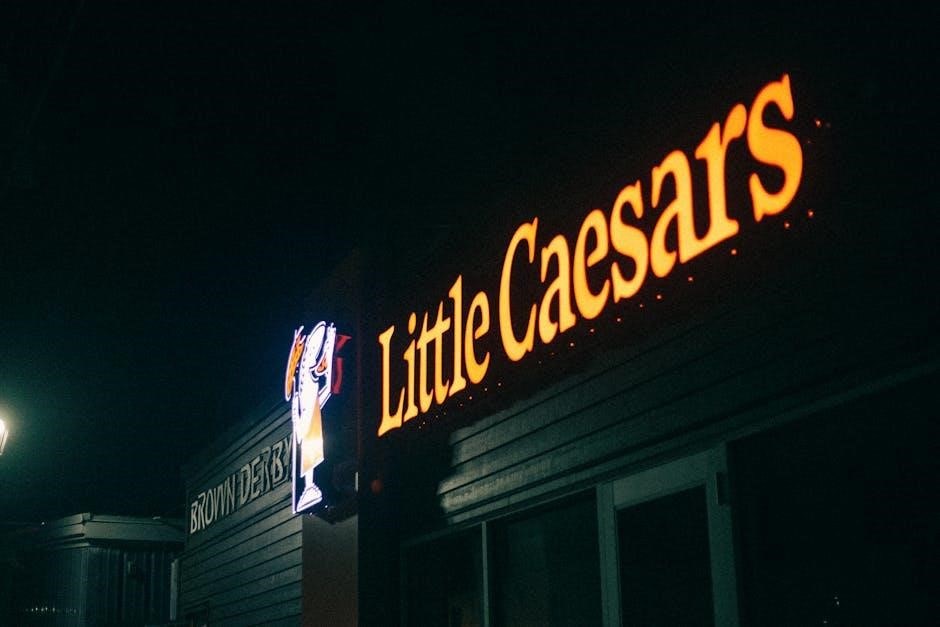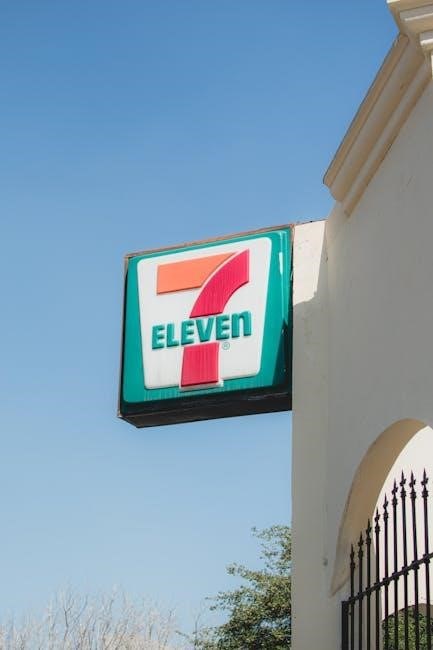The Pizza Hut Franchise Agreement outlines the terms and conditions for operating a Pizza Hut restaurant‚ providing details on fees‚ rights‚ and operational standards.
Overview of Pizza Hut Franchise
Pizza Hut‚ part of Yum! Brands‚ is a global leader in the quick-service restaurant industry‚ offering pizza‚ pasta‚ and other menu items. The franchise system allows entrepreneurs to operate restaurants under the Pizza Hut brand‚ leveraging its established reputation and customer loyalty. With over 6‚000 locations worldwide‚ Pizza Hut provides a proven business model‚ comprehensive training‚ and ongoing support to franchisees. The agreement outlines operational standards‚ marketing strategies‚ and financial obligations‚ ensuring consistency across all locations. Franchisees benefit from a recognized brand‚ innovative menu offerings‚ and a strong supply chain network‚ making Pizza Hut an attractive opportunity for those seeking to enter the fast-casual dining sector.
Importance of the Franchise Agreement Document
The Pizza Hut Franchise Agreement is a legally binding contract that outlines the rights and responsibilities of both the franchisor and franchisee. It provides clarity on financial obligations‚ operational standards‚ and termination terms‚ ensuring a structured business relationship. This document is crucial for franchisees to understand their investment‚ including franchise fees‚ royalties‚ and renewal rights. It also protects the brand’s integrity by enforcing compliance with marketing and quality standards. Reviewing the agreement with a franchise attorney is essential to navigate its complexities and ensure a successful partnership. The document serves as a roadmap for operating a Pizza Hut franchise effectively and profitably.

Key Components of the Pizza Hut Franchise Agreement
The agreement includes franchise fees‚ royalties‚ territorial rights‚ renewal terms‚ and operational standards‚ ensuring clarity for franchisees on their obligations and expectations.
Term and Renewal Rights
The Pizza Hut Franchise Agreement typically lasts for an initial term of 10 years‚ with the option to renew for an additional 10 years under specific conditions. Renewal rights are contingent upon factors such as satisfactory operational performance‚ compliance with brand standards‚ and payment of required fees. Franchisees must submit a renewal application well in advance of the agreement’s expiration date. Pizza Hut reserves the right to deny renewal if the franchisee fails to meet the stipulated criteria. The renewal process also involves updated agreements reflecting current terms and conditions‚ ensuring alignment with the brand’s evolving business model and operational expectations.
Franchise Fees and Royalties
Pizza Hut franchisees are required to pay an initial franchise fee ranging from $25‚000 to $50‚000‚ depending on the type of restaurant and location. Ongoing royalties are typically 6% of monthly gross sales‚ contributing to the brand’s operational and marketing efforts. Additionally‚ franchisees must pay advertising fees‚ which are usually 4.25% of monthly sales‚ to support national and local marketing campaigns. These fees ensure franchisees benefit from brand recognition‚ marketing support‚ and access to proven business strategies. The fees are outlined in the franchise agreement and are essential for maintaining brand consistency and operational standards across all locations.
Territorial Rights and Restrictions
Pizza Hut franchise agreements outline specific territorial rights‚ granting franchisees exclusive operating rights within a defined geographic area. This ensures no direct competition from other Pizza Hut locations nearby. Franchisees must adhere to restrictions that prevent them from opening similar businesses within the protected territory. The agreement also prohibits the use of Pizza Hut’s trademarks or intellectual property outside the agreed-upon area. These territorial protections are designed to maintain brand consistency and support franchisees in building a strong market presence. Violating these terms can lead to termination of the agreement‚ emphasizing the importance of adhering to the established boundaries.

Financial Requirements for Pizza Hut Franchise
Pizza Hut franchisees must meet specific financial requirements‚ including an initial franchise fee of $25‚000 to $50‚000 and a total investment ranging from $297‚000 to $2.2 million.

Initial Investment and Franchise Fee
Becoming a Pizza Hut franchisee requires a significant initial investment‚ typically ranging from $297‚000 to $2.2 million. This includes the franchise fee‚ which is $25‚000 to $50‚000‚ depending on the location and type of restaurant. The investment covers construction‚ equipment‚ marketing‚ and other startup costs. Franchisees must also meet Pizza Hut’s financial qualifications to ensure they can sustain the business. The franchise agreement term is usually 10 years‚ with renewal options available under specific conditions. Understanding these financial requirements is crucial before committing to the franchise agreement.
Ongoing Royalty Payments
Pizza Hut franchisees are required to pay ongoing royalty payments‚ typically ranging from 5% to 6% of monthly gross sales. These fees are essential for maintaining brand support‚ marketing efforts‚ and access to operational resources. Additionally‚ franchisees contribute to advertising funds‚ usually 2% to 3% of gross sales‚ to support national and local marketing campaigns. These ongoing payments ensure franchisees benefit from Pizza Hut’s established brand reputation‚ training‚ and continuous operational guidance. Understanding these recurring financial obligations is vital for assessing the long-term feasibility of owning a Pizza Hut franchise.
Marketing and Advertising Fees
Pizza Hut franchisees are required to contribute to marketing and advertising fees‚ typically ranging from 2% to 4% of monthly gross sales. These fees support national and regional advertising campaigns‚ promoting brand awareness and driving customer traffic. Additionally‚ franchisees may participate in local marketing initiatives‚ enhancing their restaurant’s visibility. The fees also fund digital marketing efforts‚ such as online ordering and delivery promotions. By pooling resources‚ Pizza Hut ensures consistent and impactful marketing strategies that benefit all franchisees. These contributions are essential for maintaining the brand’s competitive edge and attracting loyal customers to individual locations.

Application and Approval Process
The application process involves submitting detailed financial and personal information for review. Approved candidates then sign a development agreement‚ outlining terms for opening a Pizza Hut franchise.
Steps to Become a Pizza Hut Franchisee
Becoming a Pizza Hut franchisee involves a structured process. First‚ submit an application with financial and personal details for review. Once approved‚ sign a development agreement detailing franchise terms. Next‚ pay the franchise fee and secure a suitable location. Complete training provided by Pizza Hut to learn operations and brand standards. Finally‚ open your restaurant and maintain compliance with ongoing requirements. Each step ensures alignment with Pizza Hut’s brand and operational expectations‚ setting the foundation for a successful franchise partnership.

Role of Franchise Attorney
A franchise attorney plays a crucial role in navigating the legal complexities of the Pizza Hut franchise agreement. They review the FDD and franchise contract to ensure terms are fair and transparent. Attorneys provide legal advice on obligations‚ fees‚ and termination clauses‚ protecting the franchisee’s interests. They also assist in negotiations‚ ensuring the agreement aligns with the franchisee’s goals. Additionally‚ they help franchisees understand their rights and responsibilities‚ minimizing potential risks. Their expertise ensures that franchisees make informed decisions before committing to the agreement‚ safeguarding their investment and future business operations.

Operational Requirements
Pizza Hut franchisees must adhere to strict operational standards‚ including training programs‚ supply chain protocols‚ and brand compliance to maintain quality and consistency across all locations.
Training and Support Provided by Pizza Hut
Pizza Hut offers comprehensive training programs for franchisees‚ including classroom and on-the-job training‚ to ensure operational excellence and brand consistency. Franchisees receive ongoing support‚ such as operational audits‚ marketing assistance‚ and supply chain guidance‚ to maintain high standards and customer satisfaction. The training covers key areas like food preparation‚ customer service‚ and financial management‚ equipping franchisees with the tools to succeed. Additionally‚ Pizza Hut provides continuous updates on new products and technologies to keep franchisees competitive. This robust support system is designed to help franchisees achieve long-term success while upholding the brand’s reputation for quality and innovation.
Supply Chain and Vendor Requirements
Franchisees must adhere to Pizza Hut’s strict supply chain and vendor requirements to maintain consistency and quality. The agreement mandates sourcing ingredients and products from approved suppliers to ensure compliance with brand standards. Pizza Hut provides a list of authorized vendors for equipment‚ ingredients‚ and packaging‚ and franchisees must use these exclusively. This ensures uniformity in product quality and taste across all locations. Additionally‚ franchisees are required to follow specific inventory management and ordering processes to minimize waste and optimize efficiency. Compliance with these requirements is non-negotiable and is regularly monitored to uphold the brand’s reputation and customer expectations.

Marketing and Brand Standards
Pizza Hut franchisees must adhere to strict marketing and brand guidelines to maintain consistency across all locations‚ ensuring all promotional materials align with the brand’s image and messaging.
Brand Compliance and Advertising Guidelines
Franchisees must strictly comply with Pizza Hut’s brand standards‚ ensuring all marketing materials align with corporate guidelines. Advertising campaigns require prior approval to maintain brand consistency. Franchisees are obligated to use approved logos‚ slogans‚ and imagery‚ avoiding any deviations that could dilute the brand. Specific branding elements‚ such as signage and packaging‚ must meet predefined criteria. Failure to adhere to these guidelines may result in enforcement actions‚ including termination of the franchise agreement. Pizza Hut provides detailed manuals and support to help franchisees meet these requirements‚ ensuring a cohesive brand image across all locations worldwide.
Use of Trademarks and Intellectual Property
Pizza Hut franchisees are granted limited rights to use the company’s trademarks‚ logos‚ and intellectual property solely for operating their restaurants. The agreement prohibits unauthorized use or modification of these assets. Franchisees must adhere to strict guidelines to protect the brand’s identity. Any misuse may lead to legal action or termination. The franchise agreement details the proper use of trademarks in signage‚ marketing materials‚ and packaging. Franchisees are also required to acknowledge Pizza Hut’s ownership of all intellectual property and agree not to challenge these rights. Compliance ensures brand consistency and legal protection for both parties.

Termination and Renewal Rights
The franchise agreement outlines conditions for termination‚ including non-compliance with standards‚ and renewal rights‚ typically allowing franchisees to extend their agreement under specific terms and conditions.
Conditions for Agreement Termination
The Pizza Hut Franchise Agreement can be terminated for non-compliance with operational standards‚ failure to meet performance metrics‚ or default in royalty payments. Breaches of intellectual property terms or violations of brand policies may also lead to termination. Franchisees must adhere to all terms outlined in the agreement to avoid termination‚ which results in the loss of rights to operate under the Pizza Hut brand. Upon termination‚ franchisees are required to cease operations and remove all branded materials. Proper termination procedures ensure the protection of the brand’s integrity and legal compliance‚ maintaining the standards expected of all Pizza Hut locations worldwide.
Renewal Process and Fees
The renewal process for a Pizza Hut Franchise Agreement typically involves a standard renewal term of 10 years‚ subject to meeting specific performance and operational criteria. Franchisees must submit a renewal application and pay an associated fee‚ which may vary depending on the location and terms of the agreement. The renewal process ensures continued brand support and access to updated operational systems. Fees for renewal are outlined in the franchise agreement and are generally lower than the initial franchise fee. Franchisees are encouraged to review the renewal terms carefully to ensure compliance and maintain their operational rights. Timely renewal is crucial for sustained business growth and brand alignment.

Franchise Disclosure Document (FDD)
The FDD provides detailed information about the Pizza Hut franchise‚ including fees‚ obligations‚ and risks‚ ensuring transparency for potential franchisees before signing an agreement.
What is Included in the FDD
The Franchise Disclosure Document (FDD) is a comprehensive legal document detailing the Pizza Hut franchise opportunity. It includes information on franchise fees‚ royalties‚ contract terms‚ franchisee obligations‚ and the franchisor’s responsibilities. The FDD also outlines financial requirements‚ such as the initial investment and ongoing costs‚ as well as the renewal and termination conditions of the agreement. Additionally‚ it provides data on the franchise’s performance‚ including average sales figures and success rates. This document is essential for prospective franchisees to understand the risks and benefits of owning a Pizza Hut franchise before making a decision.
Key Sections to Review
The FDD includes critical sections that prospective franchisees must carefully review. These include franchise fees‚ royalties‚ and contract terms‚ as well as financial obligations and renewal conditions. The document also outlines the franchisor’s support and training programs‚ which are essential for operational success. Additionally‚ it provides details on franchisee responsibilities and restrictions‚ such as sourcing requirements for supplies. The FDD also includes financial performance representations‚ offering insights into the potential earnings of a Pizza Hut franchise. Finally‚ it lists current and former franchisees for reference checks‚ ensuring transparency and accountability. Understanding these sections is vital for making an informed decision.
Becoming a Pizza Hut franchisee offers significant growth opportunities with a renowned brand‚ but careful review of the agreement is essential to ensure alignment with your business goals.
Benefits of Becoming a Pizza Hut Franchisee
Becoming a Pizza Hut franchisee offers numerous benefits‚ including association with a globally recognized brand‚ loyal customer base‚ and proven business model. Franchisees gain access to comprehensive training‚ operational support‚ and marketing resources‚ ensuring a competitive edge. Pizza Hut’s established supply chain and vendor network streamline operations‚ while ongoing royalties and fees provide financial stability. The franchise agreement’s terms‚ such as a 10-year agreement with renewal options‚ offer long-term growth potential. Additionally‚ franchisees benefit from shared brand advertising‚ enhancing local visibility and customer trust. This partnership fosters a rewarding entrepreneurial experience with the backing of a successful‚ international brand.
Final Considerations Before Signing the Agreement
Before signing the Pizza Hut franchise agreement‚ thoroughly review all terms‚ including franchise fees‚ royalties‚ and renewal rights. Ensure understanding of territorial restrictions and operational requirements. Consult a franchise attorney to address legal concerns and negotiate favorable terms. Assess financial readiness for initial investments and ongoing payments. Evaluate market potential and competition in your area. Consider the brand’s support systems and training programs to ensure alignment with your business goals. Lastly‚ review the Franchise Disclosure Document (FDD) to understand risks and obligations‚ ensuring a well-informed decision. This due diligence is crucial for a successful and sustainable franchise ownership experience with Pizza Hut.